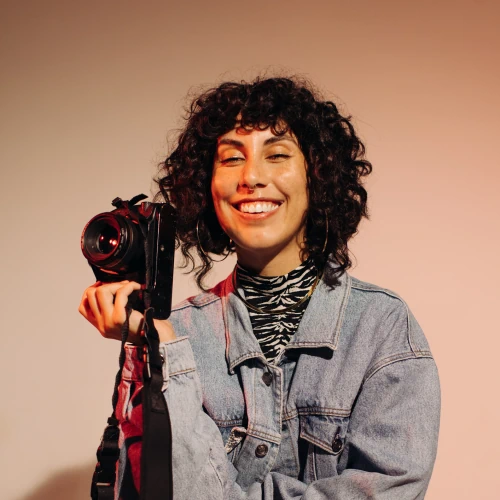There is no doubt that the process of filmmaking is exciting, especially in my mind anyway.
In the 21st century, we are lucky to have access to awesome equipment that can capture incredible visuals whenever needed.
Whether you are a professional filmmaker or just starting out, having the right camera is essential.
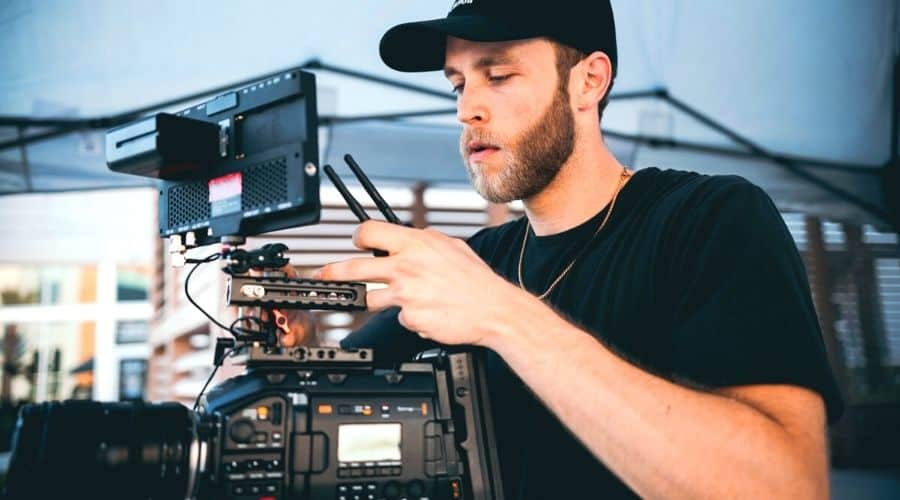
There is the saying that the best camera is the one you have with you at the time. Although that may be true, there is no doubt that having a better camera creates better results.
Whilst it is easier than ever to purchase a quality camera, the abundance of choice makes it difficult to find your perfect photography partner.
When it comes to filmmaking, the best camera is one that can capture the most beautiful images with minimal effort.
However, the majority of cameras these days can all create beautiful imagery.
It can therefore be difficult to navigate the camera world and find the one that meets your needs.
In the early days of my own filmmaking, I felt lost in the sea of so many different camera options.
With so many options available, it can be daunting to know which one is the best for your needs.
A major challenge I personally faced was getting the right camera within my budget without compromising on features.
The good news is that there are excellent cameras on the market that produce professional quality videos without breaking the bank.
It is just about knowing where to look, what to look for and taking advantage of detailed reviews provided by other filmmakers.
If you are struggling to decide on a camera, you have come to the right place.
I have tested many of the best cameras for filmmaking on the market.
Of all the cameras I have tested, these five stood out as the best cameras on the market for filmmaking on a budget:
Best Camera for Filmmaking on a Budget – Reviews
Filmmaking is an art form that requires the right equipment to create beautiful and captivating stories.
A good camera is one of the most important pieces of equipment for any filmmaker, as it will determine the quality of your work.
After personally testing the following five cameras, I found that each one is impressive for different reasons.
Sony Alpha a6400 – Best Camera for Filmmaking on a Budget Overall
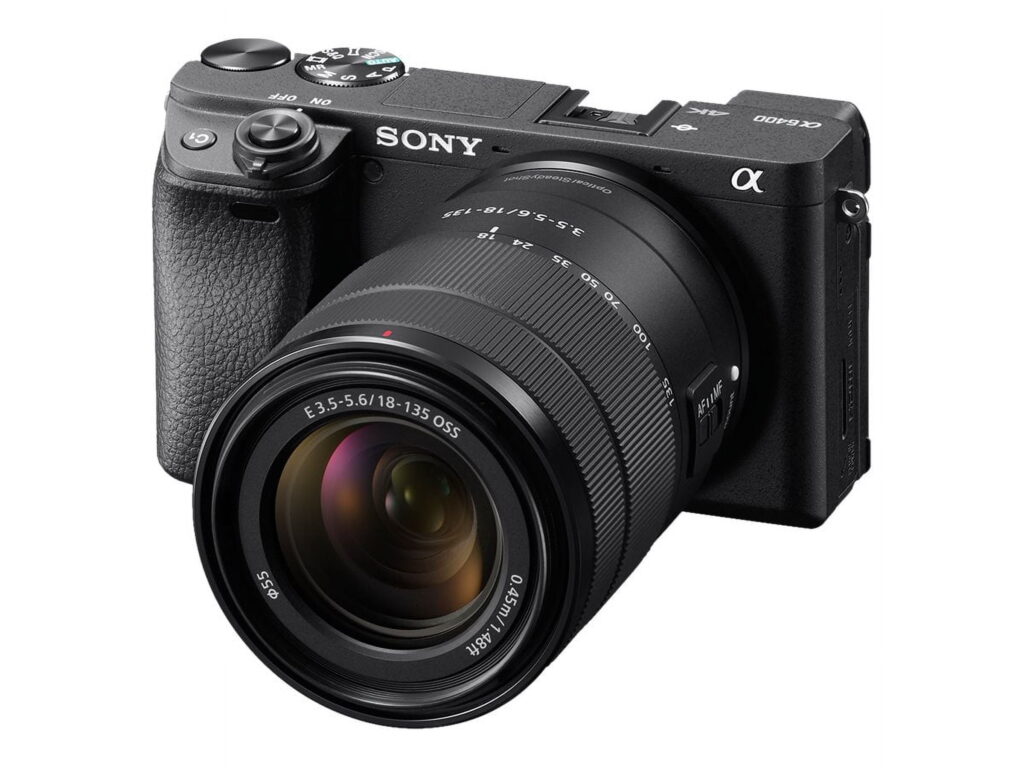
Sony has just released their latest model in the Alpha a6400 series.
This mirrorless camera is perfect for mid-level filmmakers who want to capture great video without spending a fortune.
This camera has an amazing 24MP APS-C sensor and video capabilities that are hard to beat.
The Alpha a6400 captures in stunning 4K resolution with excellent slow motion and time lapse recording.
It also has incredible low light performance and a top-notch autofocus system
This device is made to last and is compact for easy transportation.
Although the Alpha a6400 has great features, there are also a number of frustrating design issues.
There is no built-in image stabilization. This is a feature particularly important if you’re shooting an action type of video.
Those using a tripod or gimbal might find it frustrating that the SD card is placed on the bottom of the camera.
The battery performance is also below average.
However, if you can see past these slightly annoying features, the Sony Alpha a6400 is a great choice for filmmaking on a budget.
4K Resolution – This camera supports Ultra High Definition (UHD) 4K at 24 and 30fps.
Frame Rate – Records 4K at 25 and 30fps. Can record in Full HD up to 120fps.
Slow Motion – You can record fantastic slow-motion video with its 1080p at 120fps.
Time Lapse – You can shoot awesome time-lapse videos with its built-in intervalometer.
Exposure Compensation – Low light performance is mind-blowing with a great ISO range with its APS-C CMOS sensor.
Auto Focus – The latest autofocus technology is used in this camera. It supports 425 phase-detection and contrast-detection that covers most of the frame.
Video Stabilization – No built in stabilization.
Battery Life – Up to 60 minutes per charge.
Sound – Great sound quality with improved sound reduction.
On the whole, I found the Sony Alpha a6400 to be a great filmmaking camera.
It may have some irritating design flaws but those can be accommodated for its great recording features.
I found the low light performance to be exceptional and a great camera to use in multiple locations.
“Of the five cameras I tested, I thought the Sony Alpha a6500 was the best camera for filmmaking on a budget.”
Panasonic LUMIX G85 – Best Camera for Filmmaking on a Budget for Outdoor and Action Footage
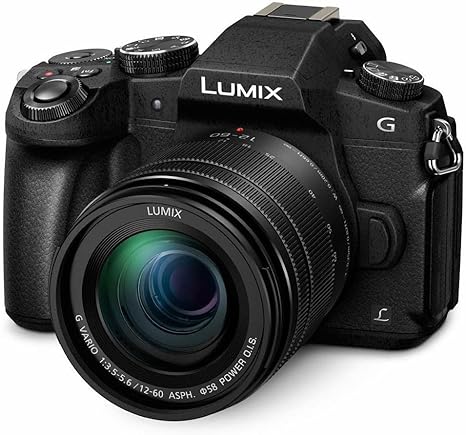
This mirrorless camera is great for filmmaking and is full of amazing features.
For its price, the LUMIX G85 has excellent picture quality with amazing 4K video recording features.
The camera is really impressive with its great performance at high ISO and precise autofocus.
It has outstanding image stabilization making it great for action shots.
The camera also boasts a fully weather-sealed body making it excellent for shooting outdoors in all weather conditions.
Of course, like any camera, it is not perfect.
Whilst the 4K recording is great quality, the recording is cropped which is incredibly frustrating.
The camera is also not great for slow motion and the digital viewfinder is far from impressive.
However, there are many features that make this camera great.
4K Resolution – Great 4K resolution but a cropped image.
Frame Rate – Records 4K at a maximum of 25fps and Full HD up to 50fps.
Slow Motion – Poor for slow motion recording with minimum frame rate.
Time Lapse – Dedicated time lapse mode for quality recording.
Exposure Compensation – Performs well in low light and high ISO settings.
Auto Focus – Great autofocus technology.
Video Stabilization – 5 axis image stabilization creates smooth, clear footage and great action shots.
Battery Life – Decent battery life up to 160 minutes.
Sound – Decent sound quality but has some background noise on the audio and no option for an external microphone.
Overall, the Panasonic LUMIX G85 offers great value for money.
Whilst definite improvements can be made, I found that for the price, this camera has great features.
My favorite feature of this camera is its suitability for the outdoors.
I also found that this camera is another worthy contender for the best camera for hiking.
“I took the Panasonic LUMIX G85 to the mountains with me and not only did it survive the rainy weather, it also produced smooth motion footage thanks to its great stabilization.”
Sony ZV-1 – Best Camera for Filmmaking on a Budget for Size
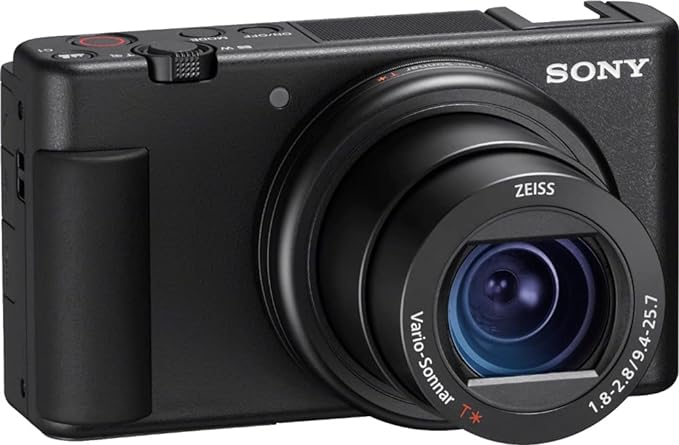
If you’re looking for an unbeatable compact filmmaking camera, then the Sony ZV-1 is an excellent choice.
This pocket-sized video camera is an amazing choice for shooting on the go.
The superior autofocus and super bright lens make it stand out from other options.
Plus, the side-flipping screen adds to its versatility and convenience.
There are a lot of elements that make this camera great but there are some points that let it down.
If you’re hoping for really smooth walking videos, this camera may not live up to your expectations. The image stabilization is sadly not great and action shots are pretty much impossible.
It also has poor battery life and does not have the option to interchange lenses.
However, for its size and weight, the Sony ZV-1 has great features.
4K Resolution – No 4K limit when recording.
Frame rate – Up to 120fps.
Slow motion – Great for slow motion recording up to 120fps with a super slow motion setting.
Time lapse – Impressive built in time lapse function with both time lapse and hyper time lapse.
Exposure compensation – Great at adapting to bright lighting conditions with a built-in ND filter that is very useful with a wide aperture.
Auto focus – Autofocus is excellent which includes real-time video eye and object tracking
Video stabilization – Features active stabilization but the result is poor.
Battery life – Up to 75 minutes.
Sound – High quality audio.
I loved the Sony ZV-1 camera for filmmaking when I was traveling.
It is important to me to have a camera that is light and compact to travel with that also performs well.
“The Sony ZV-1 ticks all the boxes and is a great option for shooting whilst traveling.”
Nikon D3500 – Best Camera for Filmmaking on a Budget for Beginners
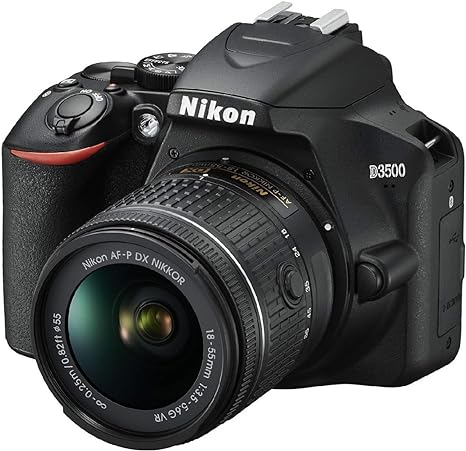
The newest addition to Nikon’s DSLR portfolio is also their cheapest and lightest camera yet.
A great option for affordability, the Nikon D3500 is great for new filmmakers and those in search of a budget camera.
The camera’s image quality is exceptional for entry-level filmmakers.
The D3500 has incredible auto focus, superb battery life and is easy to use.
It also has great ergonomics with easily accessible buttons and dials.
In addition, you can take full advantage of the excellent range of lenses Nikon offers.
When it comes to downfalls, sadly sound quality is one of them.
It is difficult to capture great audio with the camera and there is no input for an external mic.
Ultimately though, the Nikon D3500 is a great filmmaking camera for beginners.
4K Resolution – Records up to 1080p.
Frame rate – 1080p from 24fps up to 60fps. 720p in 50 or 60fps.
Slow motion – Great slow motion capture.
Time lapse – Does not have a built-in interval timer.
Exposure compensation – Performs well in difficult lighting conditions.
Auto focus – Outstanding auto focus with object tracking.
Video stabilization – Does not have built-in video stabilization however, the interchangeable Nikon lenses feature Vibration Reduction technology.
Battery life – Up to 75 minutes of continuous shooting.
Sound – Poor quality audio and no external mic jack.
Of all the cameras tested, the Nikon D3500 was the most user-friendly making it perfect for amateur filmmakers.
“I found the Nikon D3500 to be extremely easy to use, allowing beginners to create professional quality videos with ease.”
Canon EOS M50 – Best Camera for Filmmaking on a Budget for Affordability
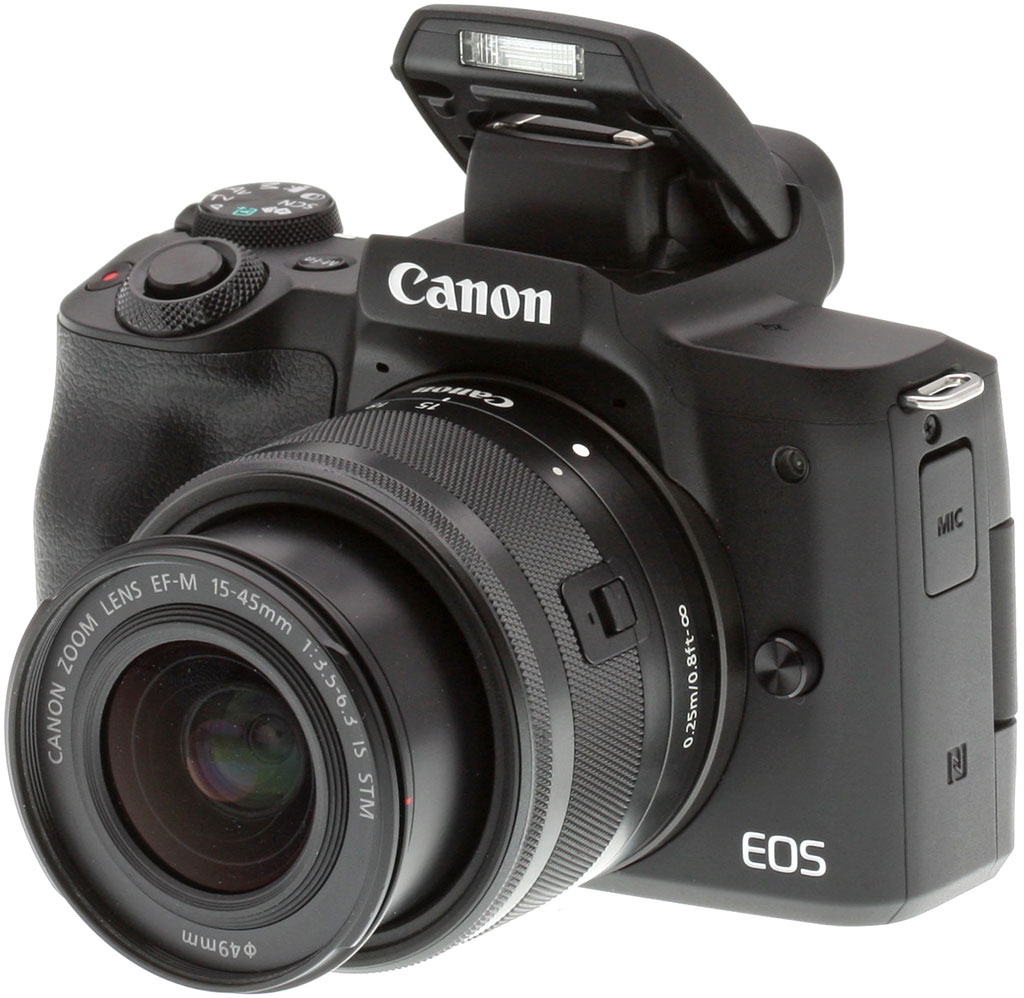
A great progression in the world of mirrorless cameras, the Canon EOS M50 packs a lot of great features into its small size.
One of the biggest selling points is the viewfinder. Many mirrorless cameras of the same size simply don’t have one making it an advantage of the M50.
The color reproduction this camera offers has a great dynamic range making it great for shooting in difficult lighting conditions.
The time lapse mode is great whilst slow motion is also excellent quality.
Video quality is pretty good but the 4K video mode has some constraints that I wasn’t expecting.
The dual-pixel auto focus does not work when shooting in 4K for starters.
And with a recording limit of 30 minutes, this restriction can be highly inconvenient.
Plus, the 15-45mm kit lens can be a bit tricky to use.
Regardless of its flaws, the Canon EOS M50 was a big step for Canon.
4K Resolution – Records 4K at 3840 x 2160 pixel resolution.
Frame Rate – Captures 4K at 24fps and Full HD at 24, 30 or 60fps.
Slow Motion – Captures slow motion at up to 120fps and in great quality.
Time Lapse – Number of time lapse modes making this camera superb for time lapse recording.
Exposure Compensation – Performs exceptionally well in difficult lighting conditions.
Auto Focus – Great auto focus but sadly does not work in 4K.
Video Stabilization – The camera features 5-axis image stabilization whilst the 15-45mm lens kit also has image stabilization.
Battery Life – Up to 120 minutes.
Sound – When audio levels are set manually, the built-in mic records clean audio. This can also be enhanced with an external microphone.
With the EOS M50, Canon has caught up to its competitors in the mirrorless market.
Although the EOS M50 Mark II is now released, the changes are minimal.
For that reason, I recommend sticking with the original and saving your money on paying for the ‘upgrade’.
“I found the Canon EOS M50 to be great for its bargain price and definitely one to consider if you’re on a budget.”
How to Buy the Best Camera for Filmmaking on a Budget
Commonly, people find it difficult to find the best camera because they think that means the most expensive.
Through my testing of cameras for filmmaking, I have found this not to be true. Just because a camera has a higher price tag does not make it a superior product.
When looking for the best camera for filmmaking, especially on a budget, there are many factors to consider.
What may be the best camera for one person, may not be the best camera for you.
It is ultimately up to you to identify what is most important for you to have and prioritize those features.
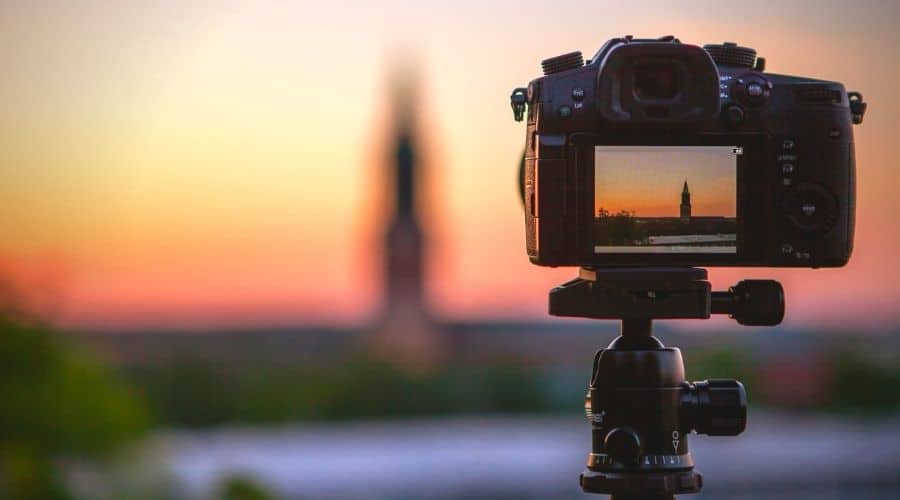
These are the things to consider when you are looking to buy the best camera for filmmaking on a budget.
DSLR Camera or Mirrorless Camera
When looking at a camera for filmmaking, the main difference is whether it is a DSLR or a mirrorless camera.
Both DSLR and Mirrorless cameras are great for filmmaking with incredible budget options.
What sets the two types of camera apart is the way it captures imagery.
DSLR cameras reflect the light that enters the lens and bounces it up to the optical viewfinder. With this technology, you can preview your shot in the viewfinder.
As the name may suggest, a mirrorless camera doesn’t use a reflex mirror. Instead, light directly enters the lens and goes straight to the image sensors.
Both have their pros and cons but are capable of producing excellent video.
Mirrorless cameras are often lighter and easier to transport.
DSLR cameras are larger in size because they have a big mounted reflex mirror.
Mirrorless cameras also have the capability to shoot at faster frame rates.
However, it is common for mirrorless cameras to drain the battery quickly. As mirrorless cameras have no optical viewfinder, the screen is used almost constantly and quickly depletes the battery.
A positive of a DSLR is the presence of a viewfinder and a greater battery life.
Most professionals use a DSLR as they offer a greater selection of interchangeable lenses than many mirrorless cameras.
Experienced filmmakers also commonly choose a DSLR due to the typically longer battery life.
However, mirrorless cameras are becoming more widely used amongst professional filmmakers as they boast the latest technology.
Personally, I prefer a mirrorless camera overall as I typically shoot when traveling. The compact size is a great advantage to me and I love using the latest technology.
Whether you choose a DSLR or mirrorless camera is all down to what you want from the camera.
4K Recording
When filmmaking, quality is of the highest importance.
Many of the current cameras on the market offer 4K recording offering exceptional image quality.
It is common to find a 4K for filmmaking on a budget.
If, however, your budget is extremely tight, Full HD cameras also offer great quality but typically have a lower price tag.
For those just starting their filmmaking journey, a Full HD camera is a great choice.
On the other hand, if you want professional quality video, there can be no compromising and a 4K camera is crucial.
With 4K resolution, your videos will be crisp and clear showing the details and intricacies of your subject.
Frame Rate
A camera with multiple frame rates offers increased flexibility for filming which is a great bonus.
Cameras with higher frame rates allow you to capture incredible slow motion content without compromising on quality.
Most cameras offer a frame rate of up to 60fps and are highly versatile cameras.
If you are planning to capture a lot of action shots or slow motion footage, cameras with a frame rate above 60fps should be considered.
With higher frame rates, you are guaranteed clear and crisp footage no matter what you are shooting.
Exposure Compensation
With a camera that performs well in difficult lighting conditions, you have struck gold.
I shoot in a lot of different environments so my camera needs to adapt to changing lighting conditions.
A camera with great exposure compensation is high on my priority list when looking for a new model.
Exposure compensation features make it easy to adjust the exposure settings of your footage, allowing you to capture great shots even in the most challenging environments.
With easy to adjust exposure settings, you can take full advantage of any lighting situation and create stunning videos.
Auto Focus
Auto focus is crucial for filmmaking.
Typically, a DSLR camera is a clear-cut winner over the mirrorless camera when it comes to autofocus.
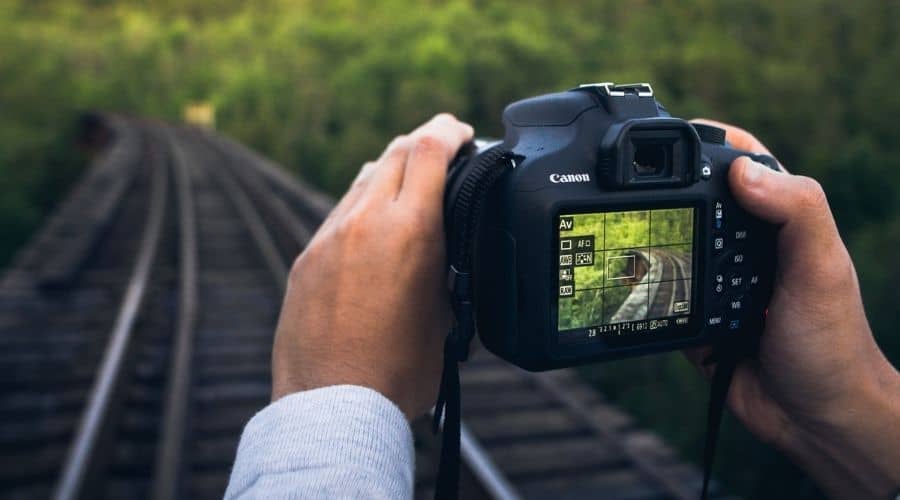
Mirrorless cameras use a single autofocus system whereas DSLR use two giving it an advantage.
Another plus is that DSLR cameras have the use of phase detection rather than contrast detection. Phase detection is faster and more accurate while using autofocus.
The current mirrorless cameras have recently caught up to the DSLR. Many now offer both types of autofocus and it works better than DSLR in some cases.
DSLR cameras remain better for quick autofocusing, however, mirrorless cameras have greater tracking features.
If you are primarily shooting action shots, the tracking features of a mirrorless camera are great.
Alternatively, a DSLR camera is a great all-rounder for its faster focusing.
Video Stabilization
Many cameras feature 5-axis image stabilizers that ensure any camera shake is eliminated. This allows you to achieve professional-looking results that are smooth and easy to view.
With the help of this stabilization feature, you can capture moments without worrying about camera shake ruining your shots.
I do a lot of filmmaking when hiking so video stabilization is important for me. Even when I am moving, video stabilization makes my footage look even and level.
Battery Life
Battery life is important for filmmaking and in some cases crucial.
There is nothing worse than shooting something and your battery going flat.
Thankfully, most cameras now have a battery life of at least an hour. This gives you plenty of time to capture without the worry of running out of juice.
However, for longer or detailed projects that require continuous captures, a greater battery life is better.
Sound
In my opinion, sound isn’t of high importance when looking for a camera for filmmaking on a budget.
Traditionally, digital cameras don’t offer terrific audio and it can therefore be a challenge to find one with great sound quality.
For novice filmmakers, the built-in microphone is decent.
However, for those looking for advanced quality, most cameras feature an external mic jack.
Best Camera for Filmmaking on a Budget – My Verdict
After testing all five of the cameras, my preferred was the Sony Alpha a6400.
I found the Sony Alpha a6400 to be the best camera for filmmaking on a budget overall.
This camera offers outstanding 4K recording with frame rates beyond 60fps making it great for slow motion.
This camera also has exceptional autofocus and is great for time lapse.
Sony Alpha a6400 – Best Camera for Filmmaking on a Budget Overall

You may, however, find an alternative camera that suits your needs better.
The Panasonic LUMIX G85 is great if you regularly shoot action or outdoors.
Meanwhile, the Nikon D3500 is impressive for newbies to filmmaking.
And if your budget is extremely tight, the Canon EOS M50 is the best choice.
Whichever camera you choose from this selection, you will have yourself one of the best cameras for filmmaking on a budget.

